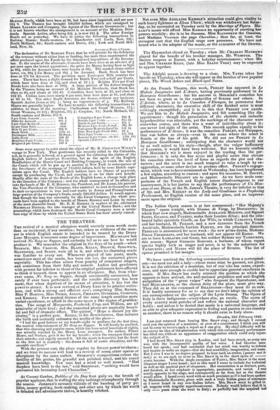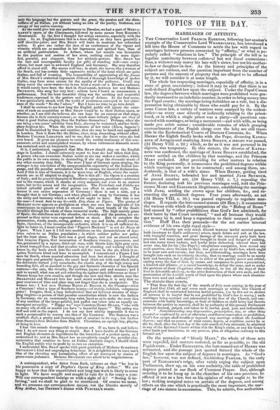We have received the following commubkcation from a correspond- ent—we
need not add a lady—whose name mbst be guessed, not given. It is not the criticism of a musician, but of one`who has sense, experi- ence, and taste enough to enable her to appreciate general excellence in music. If Mrs. &Law has really attained the pokition at which she appears to have arrived, the anti-national prejudices and anti-English antipathies of the "great vulgar" who frequent the Operahonse, and bail MERCADANTE, as the chosen deity of the place, mast give way. They did so at the command of Buramerobt—they must do so now. It is hardly necessary for us to say that we don't adopt the opinion of our correspondent on the subject of the Lyric Drama. The Opera of Italy is there indigenous—everywhere else, an exotic. The opera of every country must partake of and reflect the national character and habits : and unless it be denied that music is a universal language, and as able to give adequate expression to feeling and passion in one country as another, there is no reason why it should exist in Italy alone.
Dresden, 23d February 1842. I am just returned from hearing Mrs. SHAW sing; and though I cannot send you the opinion of a musician, or even of a connoisseur, I think you will not be sorry to receive aitch a report as I can give. My chief difficulty will be to convey an idea of the admiration with which this extraordinary performance has filled me, without an appearance of exaggeration which could only injure the subject of it.
I had heard Mrs. Snew sing in London, and had been struck, as every one was, with the incomparable quality of her voice. I had likewise once heard her speak ; and had concluded that her mind was worthy to inform and inspire so noble an organ—that she had sensibility, imagination, and taste. But I own I was in no degree prepared to bear such an orator, (passes moi le mot,) or to see such an actor as Mrs. SHAW is, in the short space of
years, become. With the single exception of PASTA, Mrs. SHAW is the most eloquent singer lever heard ; and in this word I mean to include the technical as well as the poetical part of eloquence. Her enunciation is as distinct, pure, and finished, as her emphasis is appropriate, passionate, and varied. I was nearly opposite to the stage, and consequently as far from her as the theatre would allow. I heard every word with as much precision as if it had been spoken by Mademoiselle RACHEL, given with such a truly Italian grace of utterance as I never heard in any non-Italian before. Mrs. SHAw must be gifted in all respects with singular apprehensiveness. Nobody would believe that it is only — years since she went to Italy ; so perfectly has she acquired not only the language but the gesture and the grace the passion and the disin- roltura of an Italian, yet without losing an iota Of the purity, freshness, and energy of her native country. As she could give but one performance in Dresden, we had a part of MERCA- DANTE'S opera of the Giuramento, followed by some scenes from Rosseat's Semiramide. In the first I thought her action excessive, especially with the arms. In an Englishwoman this is a beau defaut, as they have generally a stiff shoulder-joint ; and Mrs. &raw will learn to moderate her redundant action. It gave one rather the idea of an exuberance of the vigour and vivacity which are so manifest in her ingenuous and spirited face, than of an artificial gesticulation. In Arbace, where her mantle was favourable to the position and motion of her arms, nothing could be more digni- fied, graceful, and eloquent, than her attitude-gesture. Mrs. SHAW has the rare and incomparable faculty (or gift) of standing well—rare every- where, but most rare in awkward England and Germany. She may therefore afford to stand still. She moves well too; in short, she moves like a woman of the South, and has certain little expressive tricks of the head which are quite Italian, and full of meaning. The impossibility of appreciating all the finesse of Mrs. SHAW'S oratorical expression without a thorough knowledge of spoken Italian, may form some excuse for the apathy of the audience. Could any thing warm the snow-water—ice is too hard a word—of a Dresden audience, it would surely have been the duet in Serniramide, between her and Madame DEVRIENT, who sang her very best : seldom have I heard so consummate a performance. Not the least beautiful thing was the soothing and respectful tenderness expressed in the gesture and voice of Arbace. In the first scene, I was particularly struck with the world of tenderness conveyed in her utter- ance of the words" So the P adoro." But I have no time to go into detail. I shall be curious to see how long the English public will ignore the exist- ence of such an acquisition as Mrs. SHAW would be to their Italian opera, or whether, as I am told she believes, she can hope for no success on that stage, because she is their countrywoman ; so much more delicate judges are they of what is good Italian singing than the Italians themselves ! Perhaps when she can bring a ten-years' celebrity from Italy, she may be welcomed, and birth- place forgiven her. When the rich treasures of her voice (Ellen, fugaces !) shall be diminished by time and exertion, then she may be heard and applauded in London. Now it flows like the Rhine, clear, deep, abounding, without effort. Madame UNGHER LARATIER said to me, that it was the finest voice she had ever heard. It gives me pleasure to record the cordial testimony of this con- summate artist and accomplished woman, by whose retirement dramatic music has sustained such an irreparable loss. It is, I understand, suggested that Mrs. SHAW should sing on the English stage in London. I should extremely regret to hear she had taken that step. A person who can enunciate Italian music as she can makes a sacrifice, which the public is its own enemy in demanding, if she sings the dramatic music of any other country than Italy. The more I hear of German opera-singing, the stronger is my conviction of the unapproachable superiority of the Italian lan- guage, and the peculiar articulation which it creates tbr musical declamation. And if this is true of German, it is far more true of English, where the vowel- sounds are an ill adapted to singing. Nor is this all : the Opera is a creation of Italy; and its general character is Southern—gorgeous, passionate—addressed not to the reason, which it shocks at every moment, nor even to an austere taste, but to the senses and the imagination. The Freischutz and Fidelio are indeed splendid proofs of what genius can effect in another style. The former is one entire expression of Germany : there is not a note, not a thought that is not German ; and when played and sung by Germane, it has the unity and harmony which a work of art ought to have. But this is not the case—I must dare to say it—with Don Juan or Figaro. The genius of .1%1OZART never appears an prodigious as when one sees the inaptitude of his countrymen to represent what he created. The sweet breath of the South breathes through the whole of those immortal works. The high courtly grace of Spain, the stateliness and the abandon, the vivacity and the passion, are ex- pressed as they never were expressed before or since. But to complete the personation' words, music, acting, gesture, nay eye and limbs, should concur. Spite, therefore, of the incomparable orchestra, which it is an all sufficient de- light to listen to, I must confess that " Figaro's Hochzeit " is not Le Nozze di Figaro. When I saw it I fell into meditations on the distastefulness of Aus- trian rulers to an Italian population ; in which neither police nor policy had the least share. The hem was a good singer, and not an absurd actor. But imagine Figaro, that incarnation of Southern vivacity, joyousness, and fun, personated by a square, thick-set man, with blonde hair, light gray eyes, a broad tranquil face, and that peculiar way of standing and walking with the knees in, the heels stuck into the earth and the toes in the air, which it re- quires Northern blood and bone to accomplish. I remembered a Figaro I had seen far South, whose musical education had been but slender. I thought of the supple and graceful figure, the small head thick-set with coal-black curls, the delicately-turned jetty moustache, the elastio step of the high instep and bounding foot, all so assorted to the gay and fantastic character of his Spanish costume—the ease, the vivacity, the reckless, joyous gait and manner ; and I said to myself, what can art and schooling do against such differences as these? Nature keeps her own moulds, and though she now and then admits men like SHARSPERE and MOZART into her most secret workshop, it is only that we poor creatures of time and place may not forget that she is omnipotent. The women too : I had seen Madame RONZI DI BEGNIS in the Countess—what a Countess! what a type of Southern beauty—of stately, indolent, voluptuous grace! Imagine, then, a long lackadaisical face set between streams of drop- ping ringlets—a person of that peculiar constitution which is now the fashion in Germany, viz, an enormously long waist, laced so as to make the mere idea of any exertion of the lungs painful, and puffed out below into an equally ex- travagant rotundity. "happy we," says Countess Flousi-HuLEN, "who with so many ells of silk or muslin can have a beautiful figure.'" The acting was stiff and cold as the aspect. I do not say how utterly impossible it was to such a personnalite to convey one idea of the Countess. The Susanna was a niedlicheZofe, a pretty and charming sort of creature in its way ; but further from Susanna than Dresden from Madrid. Chernbino, an espiegle boy, playing at being in love.
I fear this sounds disrespectful to German art. If so, burn it, and believe that I do not mean any thing so stupid. r But I have doubts of the German and English elements as ingredients for the formation of a perfect opera, as I understand it; and as Mrs. SHAW has so completely caught the peculiar cha- racteristics that combine to form an Italian dramatic singer, I should think the English public wise to profit by so rare an exception. I understand Mrs. SHAW speaks with great gratitude of Madame Scala:man DEVRIENT'S kind and ungrudging behaviour. It is delightful not to have one's idea of the elevating and humanizing effect of art destroyed by stories of green-room jealousies. Madame DEVEIENT can afford to be magnanimous.



























 Previous page
Previous page